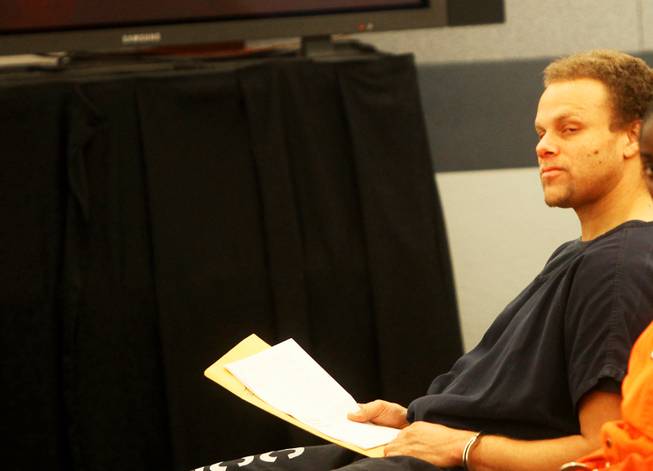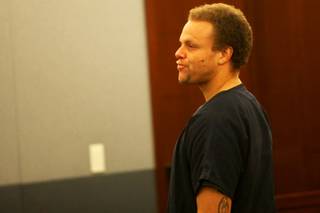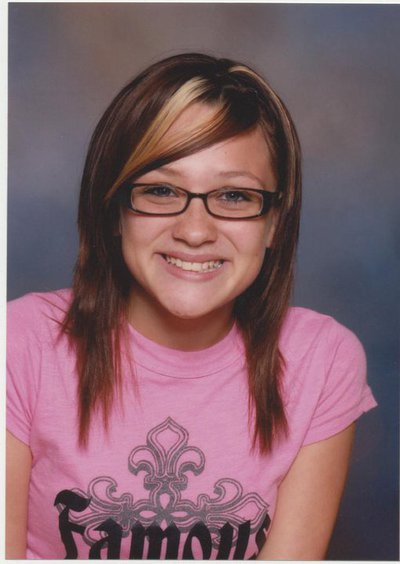
Norman Belcher appears in front of the judge in Clark County District Court on Wednesday, Feb. 23, 2011.
Monday, Sept. 26, 2011 | 12:10 p.m.
Sun Archives
- New hearing set for man accused in shooting death of 15-year-old girl (8-22-11)
- Man competent to stand trial for shooting death of 15-year-old girl (8-11-11)
- Judge won't let man change plea to guilty in teen girl's shooting death (7-18-11)
- Man pleads not guilty in fatal shooting of 15-year-old girl (3-23-11)
- Arraignment delayed again for man accused in slaying of Las Vegas teen (2-9-11)
- Arraignment delayed for man accused in slaying of Las Vegas teen (2-1-11)
- Man accused in slaying of 15-year-old girl bound over to district court (12-7-10)
- Hearing set for man accused of fatally shooting teen girl (12-7-10)
- Police: Teen girl fatally shot amid father’s dispute over money (12-7-10)
- Coroner identifies 15-year-old girl killed in double shooting (12-6-10)
Norman Belcher still has not yet decided whether to accept his court-appointed attorneys to represent him in connection with the death 15-year-old Alexus Postorino, who was killed in a drug-related burglary last year in Las Vegas.
Belcher appeared today before Judge Elissa Cadish and told her he wanted to get on with the process of making a guilty plea and being sentenced in connection with the slaying — and that he didn’t see any reason to use the attorneys the court has assigned to him, Robert Langford and Lance Maningo.
Belcher entered a plea of not guilty in March. Since that time, he has tried to have the court appoint different attorneys to represent him and in July said he didn’t want Langford and Maningo and wanted to change his plea to guilty.
However, “you need to have counsel to represent you in this very serious matter,” Cadish told Belcher today. “These are skilled and qualified counsel who do not have a conflict of interest. I don’t know what to tell you — you need to proceed with counsel.”
Belcher’s trial has been set for Feb. 21, 2012. Belcher has been charged with burglary while in possession of a deadly weapon, two counts of robbery with the use of a deadly weapon, murder with the use of a deadly weapon, attempted murder with the use of a deadly weapon, battery with the use of a deadly weapon resulting in substantial bodily harm, and third-degree larceny. Prosecutors plan to seek the death penalty.
Cadish told him he needed to communicate with Langford and Maningo so they could help him. She said she didn’t have a reason to terminate them from representing him and hiring two other lawyers to represent him in the case. Two lawyers are needed because the state is seeking the death penalty.
“So are you going to cooperate with them and continue with counsel?” Cadish asked him.
“I doubt it,” Belcher said.
“Well, what are you going to do? She asked him. “... You’re facing very serious charges and I want you to have the kind of representation you ought to have to challenge the state’s case.”
Cadish told him that sentencing would be a big part of what the attorneys would need to be researching and preparing for.
Belcher said he didn’t know what kind of evidence the state has against him.
“We’ll go meet with Mr. Belcher, your honor, and go over the evidence very carefully,” Langford told the judge. Langford said they would discuss various legal strategies with him.
“Are you going to meet with them and let them talk to you about those issues?” Cadish asked the defendant.
“I’m not sure right now,” Belcher said.
“I can’t force you to participate with them. But you’re not going to complain later that you didn’t have adequate counsel if you choose not to communicate with them,” Cadish said.
Belcher said he understood.
“I want you to have every possible representation that you can in this case,” Cadish said. “You have two very competent, experienced counsel that are prepared to do that for you. It’s only going to happen if you communicate with them about strategy and preparation for this trial.”
“How are we going to talk about strategy when all they tell me is that I’m going to be found guilty?” Belcher asked.
Cadish ordered that Belcher have a conversation with his court-appointed attorneys and that he needed to participate in the conversation.
She set another status check on the case for 8:30 a.m. Oct. 24.
“I’m hoping that you will be satisfied that your counsel are looking at both aspects: the guilt phase and the penalty phase,” Cadish said. “And they need your help to do that. And we’ll see where you are at that point. And if I need to hear from you separately, then I will do that. Let’s go ahead and have the conversation, which ought to take some time to go through what the state’s got in this case and how best to respond to it.”
Belcher also asked the judge if she had received his apology letter for how he acted in court the last time he was before her.
In July, Belcher had told the court he wanted to change his plea from not guilty to guilty and didn’t want to be represented by Langford and Maningo. The attorneys told the judge they had not been able to speak with him and questioned his competency. So the judge ordered that Belcher be examined by a psychiatrist.
At that time, Belcher had raised his voice and said he was competent. He also said loudly that he didn’t want to meet with the attorneys and that he didn’t want to come back to court for a competency hearing.
However, Belcher did later decide to come back to court. On Aug. 11, Judge Kathleen Delaney found him to be competent.
Cadish said she had read his apology letter and told him “I do accept that apology. ... Obviously you’re in a difficult situation, but I do want to have the best possible representation for you... I want to be sure your rights are protected.”
Chief Deputy District Attorney Christopher Lalli asked to see a copy of the letter that Belcher sent to the judge and the judge said she would get it to him.
At Belcher's preliminary hearing, Alexus Postorino's father, Bill Postorino, testified that the shooting followed a disagreement that he and Belcher, who were friends, were having over money.
Postorino told the court that he sold drugs out of his home because he didn't have a job. He also testified that Belcher was familiar with his home and knew that he kept drugs and money in a metal safe in the home's master bedroom.
Postorino said he had accused Belcher of breaking into his home earlier, on Dec. 1, and stealing drugs, money and other items. Postorino also said Belcher had confronted him about owing him money and that he had eventually had another man who lived at the house, Nicholas Brabham, pay back the money.
Brabham testified at the hearing in January from a hospital bed at University Medical Center.
Brabham testified that Belcher shot him twice, then Belcher came up the stairs and went into the master bedroom. Postorino testified he wasn't home at the time and was letting his daughter, Alexus, use the master bedroom while hers was being painted.
Police said when they arrived they found both Alexus Postorino and Brabham suffering from multiple gunshots. Both were taken to UMC, where the teenager died.



Join the Discussion:
Check this out for a full explanation of our conversion to the LiveFyre commenting system and instructions on how to sign up for an account.
Full comments policy